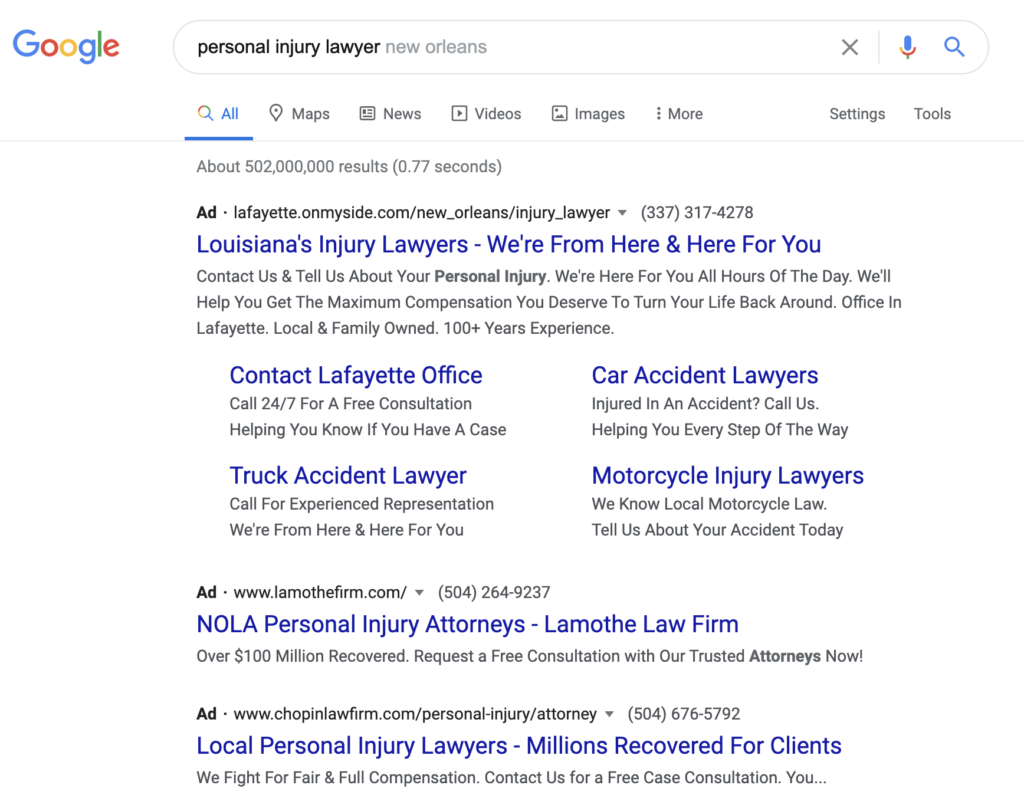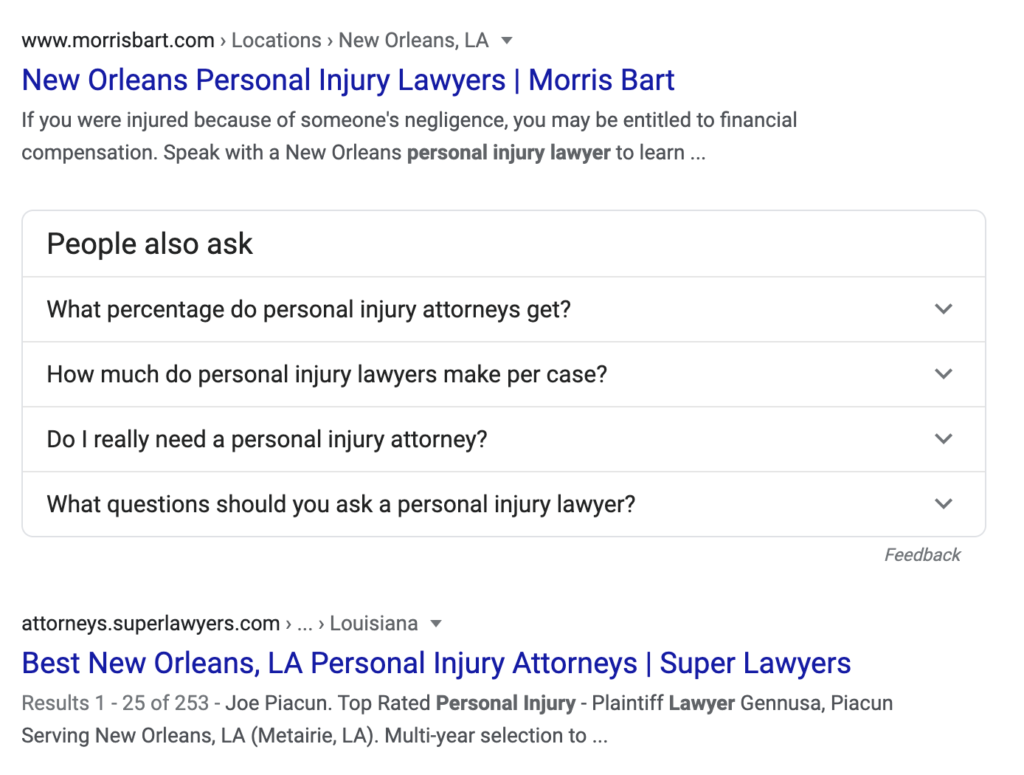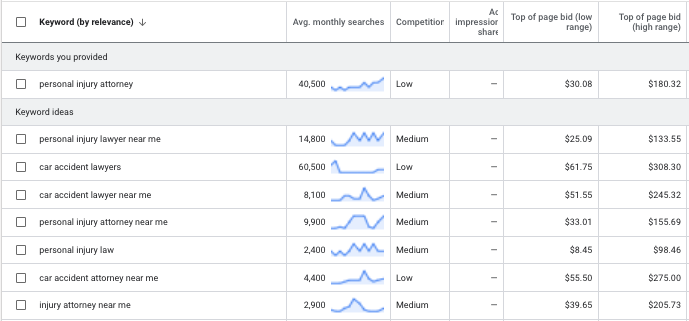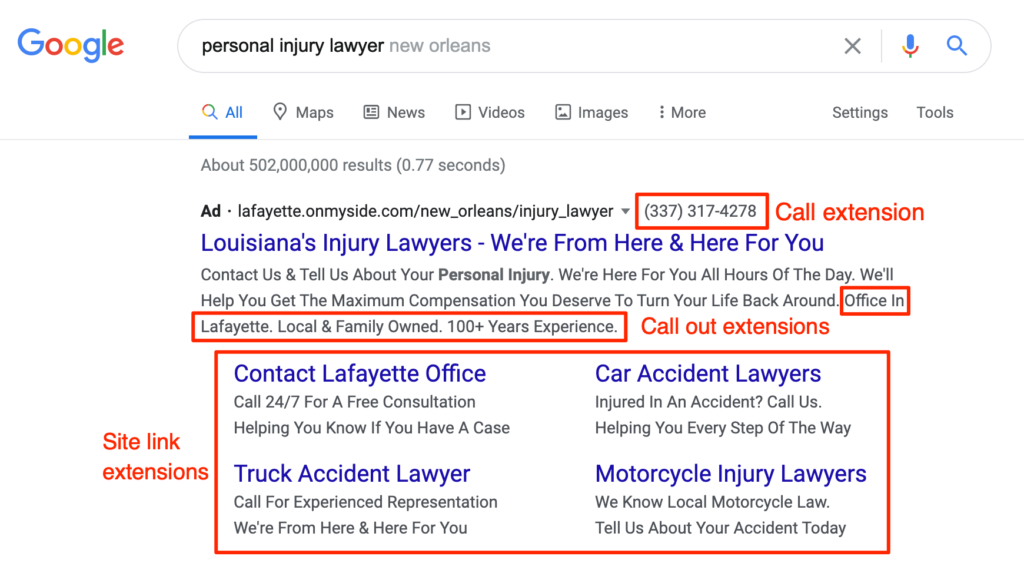Someone searching for lawyer-related terms on the internet is likely to be in the research stage of choosing a firm to hire. One of the best ways to take advantage of that moment, cut through the noise, and reach that ready-to-call searcher with a targeted message is to create a Google Ads campaign.
Google Ads is a popular form of PPC (pay-per-click) advertising for attorneys and law firms, and typically one of the largest expenses in a lawyer’s marketing budget. Using Google Ads, you can pay to have your advertisement appear above the organic results in searches for specific keywords.
This powerful strategy can result in high-quality traffic, leads, calls, and new clients. It can also result in a lot of wasted money. The Google Ads market is extremely competitive in the legal field, and keywords related to lawyers/attorneys/law firms are some of the most expensive to bid on, with many of them costing over $100 per click.
That’s why it’s crucial that you don’t go into search engine advertising without a carefully considered strategy. We created this guide on Google Ads (PPC) for lawyers to help you set yourself up for success and avoid the mistakes that many others had to learn about the hard way.
How Does PPC Advertising Work?


The basic definition of a PPC advertisement is an online advertisement that the advertiser pays for every time someone clicks on the ad. There are several platforms that can be used for PPC advertising, and while you shouldn’t ignore other options, we’re going to focus on Google Ads because it is the most popular for attorneys and law firms.
Google Ads can allow you to place advertisements:
- At the top of Google search results
- In YouTube search results
- On websites and apps within the Google display network
Google Ads works on a bidding system, which means advertisers bid on search terms they want their advertisements to appear in the results for. When someone enters a search query, Google’s algorithm decides what ads to display based on a combination of:
- Who has the highest bid for that keyword
- Which ads have the highest quality score
Google Ads “quality score” is based on click-through-rate, ad relevance, and landing page experience for the user. This is how Google filters out irrelevant or low-quality advertisements.
Start with Keyword Research and Develop a Bidding Strategy
Keyword research is the process of determining which keywords you should bid on. You can use Google’s Keyword Planner tool to generate keyword ideas and get data that helps you determine which keywords are worth targeting. You should select keywords based on:
- Intent: Choose keywords that indicate the searcher is close to hiring a lawyer. Avoid keywords that indicate the searcher is simply looking for information
- Search Volume: If no one is searching for the keywords you are targeting, you won’t get any traffic from your ads. Keywords with extremely high search volume may be too broad and too difficult to compete for
- Competition: Keyword Planner gives each keyword a High, Medium, or Low competition rating to show you how many people are bidding on it
- Cost: You will also be able to see the suggested bidding price for each keyword

Search keywords are typically broken down into these four types of keywords:
- Broad match: Set by default, shows on searches that include misspellings, related searches, and other relevant variations.
- Broad match modifier: Like broad match, but with more control. This option ensures that your ads only show in searches that include the words you’ve marked with a plus sign.
- Phrase match: Shows on searches with the exact or close variation of the phrase by adding words before or after the phrase, but not in between.
- Exact match: Shows on searches exactly as typed or a very close variation. Designated by [brackets].
The budget you need to get started with search ads will depend on the area of law you practice. For more competitive practice areas like personal injury and criminal defense, we recommend starting with a $2,000-$3,000 per month budget. Less competitive areas such as estate planning and bankruptcy law can get started with a $500-$1,000 per month budget.
Create a High-Quality Landing Page for Each Ad
Getting clicks is only half the battle. Your landing page is responsible for turning clicks into leads. The landing page is the page that your advertisement directs clicks to. You can use your website’s homepage or a service page as a landing page. However, to maximize your results it is highly recommended that you create a unique landing page that is specific to the service you are advertising.
- Start with a compelling headline that matches the text used in your ad
- Include only relevant and necessary information that the user would want to know before calling or filling out your lead form
- Include a high-quality video to go along with your copy, if you have one
- Include positive reviews or testimonials as a trust indicator
- Include a simple lead form to capture prospects’ contact information so that you can reach out to them
- Make sure your landing page loads fast, is simple to navigate and is optimized for mobile use
A high-quality landing page will improve your quality score, which increases your chances of showing up at the top of search results. It will also improve your campaign’s conversion rate.
Use Ad Extensions to Boost Your CTR (click-through-rate)

According to Google:
“Extensions expand your ad with additional information—giving people more reasons to choose your business. They typically increase an ad’s click-through-rate by several percentage points. Extension formats include call buttons, location information, links to specific parts of your website, additional text, and more.”
If you want to maximize the performance of your Google Ads, extensions can give you the extra space you need to give the information that convinces a searcher to click.
Use Negative Keywords to Increase the Quality of Your Traffic
Negative keywords can be entered into a campaign to prevent your advertisement from showing up in searches for keywords that are irrelevant to your campaign. For example, you may want to capture traffic from the search term “divorce lawyer”. However, it wouldn’t be useful for you to capture traffic from people searching for “divorce lawyer job listings” or “how to become a divorce lawyer”.
Remember that with PPC ads, you pay for every click. That means you don’t want to waste money putting your ads in front of people who aren’t explicitly searching for your services. These are the categories for negative keywords that can help lawyers refine their Google Ads campaigns and get more relevant, targeted traffic:
Locations: Every state that is outside of your target area, and major cities within your own state that you don’t want to target.
Career-Related: Any terms related to jobs, job listings, careers, hiring, internships etc.
Education-Related: Any terms related to training, schools, colleges, universities, classes, courses, books, scholarships, etc.
Cost-Related: Unless affordability is one of your major selling points, you may want to enter terms like cheap, free, discount, pro bono, etc.
Guides and Resources: Terms like how-to, guide, blog, e-book, news, articles, statistics, etc.
Use Strong Calls to Action in Your Ad Copy
Your ad copy, or the text displayed in your ad, plays a major role in the performance of your campaign. Make sure your title and body copy are thoughtful, engaging, and contain the information your prospects need to know.
Here are some examples of short and sweet calls to action that work well for lawyers:
- Get What You Deserve
- Schedule a Free Consultation
- Find Out How Much Your Case Is Worth
- Talk To A Lawyer Now For Free
- Call Us 24/7
- Call Now For A Free Case Evaluation
Monitor Your Results and Refine Your Strategy

Unfortunately, you won’t see results overnight. Depending on your niche and the keywords you chose to target, it can take several weeks to start seeing leads come in, and several months for your campaign to gain serious momentum. It’s important to be patient and not give up on your Google Ads campaign before it has a chance to mature.
It’s also important to continuously monitor your campaigns to know where you stand. Keep an eye on your click-through-rate, average cost-per-click, conversion rate, cost-per-conversion, and other metrics provided on your Google Ads dashboard.
If you have given your campaign a fair amount of time to get started and still aren’t seeing the results you want, you may want to consider making some adjustments.
- Rethink your target keywords
- Write more attention-grabbing and persuasive ad copy
- Make your landing page more persuasive and easier to use
Conclusion
With proper planning, implementation, and monitoring, Google Ads (PPC) can go a long way for lawyers and law firms. It can be costly, but the ROI can be exponential. If you are thinking about getting started with PPC and need professional assistance to ensure you don’t burn through your budget, contact the experts at Olly Olly. We’ve been helping lawyers with PPC campaigns for years and we have the experience to predict what will and won’t work for your firm.

Article by Stephanie Pereira
As a PPC Specialist, Stephanie manages pay-per-click advertising campaigns including the strategy, design, implementation, and performance analysis. She enjoys finding new ways to improve ad performance by implementing innovative tactics to generate better results for our clients.
Like what you read? Send Stephanie a message here.

